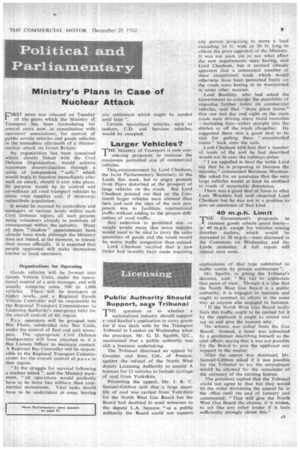Ministry's Plans in Case of N uclear Attack FIRST news was
Page 11

If you've noticed an error in this article please click here to report it so we can fix it.
released on Tuesday I of the plans which the Ministry of Transport has been formulating for several years now, in consultation. with operators' associations, for control of public service vehicles and goods vehicles in the immediate aftermath of a thermonuclear attack on Great Britain.
An organization has been conceived which, closely linked with the Civil Defence Organization, would achieve maximum decentralization through a series of independent " cells " which wo.ufil begin to function immediately after such an attack, should it ever take place. Its purpose would be to control and ea-ordinate all road transport vehicles to move vital supplies and, if necessary, redistribute population.
It would be manned by controllers and • managers at various levels within each Civil Defence region, all such persons being volunteers already in positions of consequence within the industry. Many of these " shadow " appointments have already been made although the Ministry does not intend, at the moment, to release their names officially. It is expected that people appointed will make themselves known to local operators.
Organizations for Operating Goods vehicles will be formed into Goods Vehicle Units, under the operational control of a unit manager, and will usually comprise some 500 to 1,000. vehicles. There will be managers at higher levels, and a Regional Goods Vehicle Controller will be responsible to the Regional Transport Commissioner (a Licensing Authority's emergency title) for the overall control of his region.
P.s.v. operators will be grouped into Bus Fleets, subdivided into Bus Units, under the control of fleet and unit managers, The appropriate Civil Defence headquarters will have attached to it a Bus Liaison Officer to maintain contatt. A Regional Bus Controller will be responsible to the Regional Transport Commissioner for the overall control of p.s.v.s in that region.
"in the struggle for survival following a nuclear attack ", said the Ministry statement, "all operations would probably have to be more like military than commercial movements. Vital tasks would have to be undertaken at once, leaving any settlement which might be needed until later ".
Certain specialized vehicles, such as tankers, C.D. and Services. vehicles, would be excepted.
Larger Vehicles?
THE Ministry of Transport is now considering proposals to increase the maximum permitted size of commercial vehicles.
This announcement by Lord Cheshain, the Joint Parliamentary Secretary, in the Lords this week, led to angry protests from Peers disturbed at the prospect of large vehicles on the roads. But Lord Chesham pointed out that on the Continent larger vehicles were allowed than here and said the idea of the new proposals was to facilitate international traffic without adding to the present difficulties of road traffic.
Any reduction in permitted size or weight would mean that more vehicles would need to be iiied to carry the same quantities of goods and the result would be worse traffic congestion than existed, Lord Chesharn recalled that a new Order had recently been made requiring any Person propcising to move a load exeeeding 14 ft. wide or 90 ft. long to obtain the prior approval of the Ministry. It was too soon yet to say what effect the new requirements were having, said Lord Cheshatt, but it seemedalready apparent that a substantial number of these exceptional loads which would otherwise have been permitted freely on the roads were having to be transported in some other mariner. .
Lord Boothby, who had asked the Government to consider the possibility of imposing further . limits on commercial vehicles, said that "these great trains" that one met day and night on the maid roads were driving many timid motorists —including him—either straight into the ditches or off the roads altogether. He suggested there was a .good deal to be said for getting these " uncontrolled . trains" back onto the rails.
Lord Chesharn told him that -a number of loads of the sort he had described woufd not fit onto the railways either.
"I am appalled to hear the noble Lord say that he is proposing to increase the maxima," commented BarOness Wootton. She asked for an assurance that the very large vehicles would at least be confined to roads of reasonable dimension.
There was a good deal of force in what Lady Wootton had said observed Lord Chesham but he was not in a position to give an assurance of that kind.
40 m.p.h. Limit THE Government's proposals to increase goods vehicle speed limits— to 40 m.p.h. except for vehicles towing drawbar trailers, which would be increased to 30 m.p.h.—were discussed in the Commons on Wednesday and the Lords yesterday. A full report will appear next week.




















































































